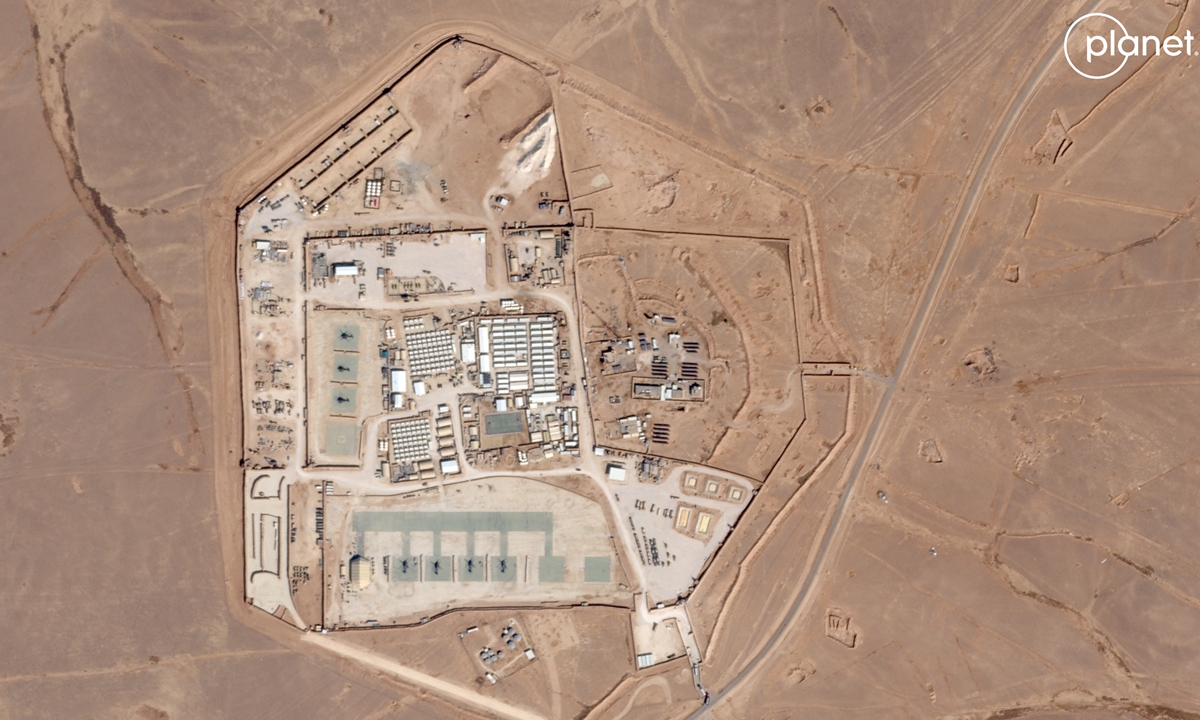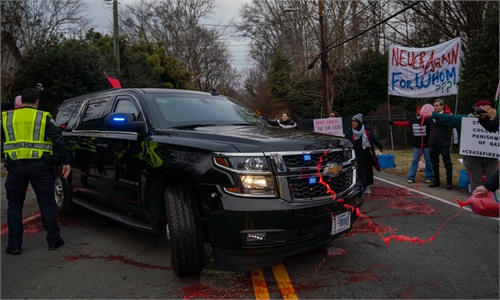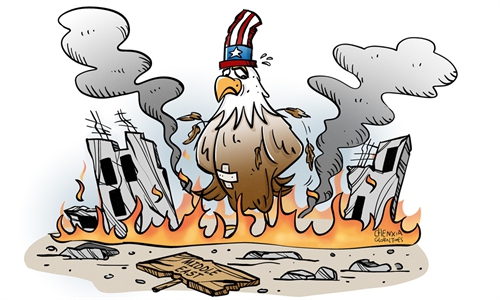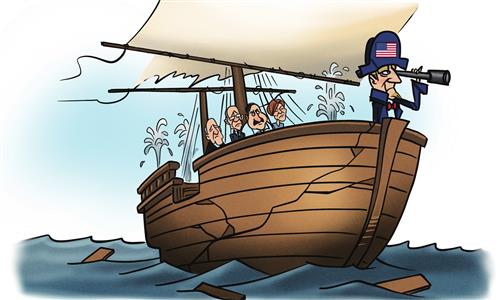Possible responses to deaths of US soldiers pose challenge for Washington
Excessive reaction will entangle US in Mideast crisis it tried to avoid: experts

The attacked base was named by US officials as Tower 22. Photo: AFP
The US has pledged to retaliate against the recent drone attack in Jordan that resulted in the deaths of three American soldiers and left more than 30 injured. However, determining the form of response presents a challenge to Washington. An excessive reaction risks entangling the US further in the complex Middle East crisis, while a weak response may undermine its global standing and appear embarrassing, said Chinese experts, noting that a continued US presence in the region will only bring the country closer to a real war.Three US soldiers were killed and more than 30 injured in the drone attack on a US base near Jordan's border with Syria. Scores of US personnel have been wounded, including some with traumatic brain injuries, during the attack.
After the incident, US President Joe Biden claimed the attack was carried out by "radical Iran-backed militant groups." He vowed "We shall respond," AP reported.
However, in a statement on Monday, Iran's mission to the United Nations said that Tehran was not involved in the attack that killed the US service members, media reported.
The mission said, "Iran had no connection and had nothing to do with the attack on the US base… There is a conflict between US forces and resistance groups in the region, which reciprocate retaliatory attacks." It is the first time that a strike has killed US soldiers in the region since the Palestine-Israel conflict broke out in October 2023.
A US official was quoted by the Telegraph as saying that the drone strike on US troops was "the most deadly attack since October 17," when attacks on US personnel in the region began, and "clearly an escalation of significance," adding that the Pentagon had launched an immediate investigation into how US air defenses did not repel the strike.
Headache for the US
Chinese experts questioned whether the retaliatory action will be confined to the militant groups that the White House has blamed for the attack, or widened to Iran, the country the US has accused of supporting those militant groups.
The US must target different militia groups in the region if it decides to carry out retaliatory attacks against militant groups, as the identity of the culprits behind the assault on US troops remains uncertain, professor of the School of International Studies and a senior researcher of the School of Global and Area Studies at Renmin University of China, told the Global Times on Monday. Tian further noted that the US may find itself trapped in a similar quagmire in the Middle East as it did following the 9/11 attacks.
In fact, the US is now in a bind as to what form its response will take. Engaging in excessive attacks on the militants or resorting to retaliatory measures against Iran would only serve to entangle the US further in the web of the Middle East crisis, a nightmare that the country is keen to avoid repeating. Conversely, a feeble response would risk tarnishing Washington's image, leaving it vulnerable to accusations of embarrassment and weakness on the global stage, Liu Zhongmin, a professor at the Middle East Studies Institute of Shanghai International Studies University, told the Global Times on Monday.
Liu said that the US is facing growing pressure as the Palestinian-Israeli conflict drags on, thus the US dilemma of choosing how to respond to the recent attack reflects the contradiction in its Middle East strategy of engagement and withdrawal.
According to experts, the US' involvement in the Middle East appears increasingly perilous, even if it were to overlook this particular attack. The potential sinking of a US warship by militant factions in the region would not only pose a severe challenge to Washington's image, credibility, and hegemony but also bring the country closer to the brink of war, cautioned Liu.
Yemen's Houthis launched a rocket at US warship Lewis B. Puller as it sailed through the Gulf of Aden on Sunday, the group's military spokesman said in a statement on Monday.
Back home, Biden is also under mounting pressure to ratchet up the scale of his response. Republicans in Congress said the administration's approach had failed to deter America's adversaries in the region.
"We need a major reset of our Middle East policy to protect our national security interests," said Republican Representative Michael McCaul of Texas, chairman of the House Foreign Affairs Committee, AP reported.
Senator Lindsey Graham of South Carolina went further, urging the administration "to strike targets of significance inside Iran, not only as reprisal for the killing of our forces, but as deterrence against future aggression. The only thing the Iranian regime understands is force."
Liu said this loss and the fermenting chaos across the Middle East is becoming increasingly unfavorable for Biden as the presidential election looms closer.
Reaching out
As the US finds that handling the Middle East crisis is getting thornier by the day, it is now seeking China's help to assuage the conflict in the Red Sea, as Yemen's Houthi armed group continues attacking ships in the region.
Wang Yi, a member of the Political Bureau of the Communist Party of China Central Committee, held a new round of talks with US National Security Advisor Jake Sullivan from Friday and Saturday in Thailand.
According to a readout issued by the Chinese Foreign Ministry, the two talked about not only bilateral relations, but also regional and international issues, including the Middle East, Ukraine, the Korean Peninsula and the South China Sea.
After the meeting, a number of US media outlets reported that the US failed to prod China into pressuring Iran to stop Houthi attacks on commercial shipping in the Red Sea.
The Biden administration has been making the case to Beijing that it should help "in terms of quieting some of those attacks, but whether it chooses to use that leverage in that way, I think that remains to be seen," a senior administration official told reporters during a call on Sullivan's meeting on Saturday, US media outlet Politico reported.
Counting on China to pressure Iran to stop Houthi attacks is an overly simplistic notion, because China is not in a position to pressure Iran, and neither do the Houthi completely follow Iran's orders, said Liu.
China has been making active efforts to ease tensions in the Red Sea from the very beginning, having called for an end to the attacks on civilian ships and urging relevant parties to avoid adding fuel to the tensions in the Red Sea, Wang Yi said in an interview with media after concluding his trip to Africa earlier this month.
The US has displayed a perplexing contradiction in its approach toward China's involvement with Middle Eastern countries. While it has often viewed China's collaboration with these countries with a sense of envy, it now finds itself seeking China's assistance in resolving the ongoing crisis, said Liu, who added that the US should take a lesson from the Red Sea crisis and recognize the imperative nature of cooperating with China on Middle East issues.





